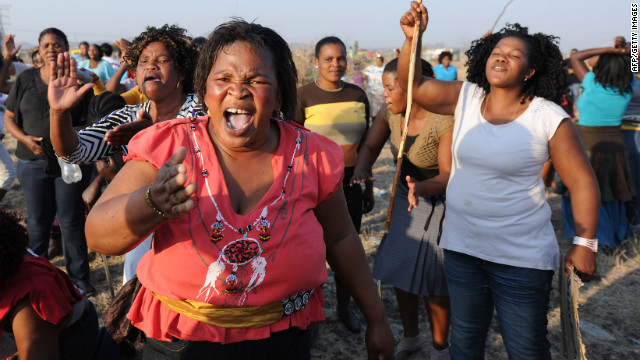 Sibongile Sikhuze pointed to his bandaged right knee, showing where a bullet entered and exited. He then raised his right palm, struck by a rubber bullet when he tried to surrender.
Sibongile Sikhuze pointed to his bandaged right knee, showing where a bullet entered and exited. He then raised his right palm, struck by a rubber bullet when he tried to surrender.
“They ordered us to lie on the ground. People were falling all around me,” Sikhuze told CNN Saturday, two days after police opened fire on striking miners.
“Another bullet grazed my head. I didn’t think I’d come out alive. That’s why I raised my hands. I thought we would all perish there. We were surrounded by the police.”
Saturday, thousands of people gathered outside the platinum mine, angry about the incident’s toll: 34 mine workers killed, 78 others wounded, 259 arrested on various charges, including malicious damage to property, armed robbery, illegal gathering and possession of weapons.
The situation was calm, but tense, as police stood on guard near the protest and helicopters conducted surveillance.
Desperate relatives, meanwhile, continued searching for miners who have not been unaccounted for.
A day after South African President Jacob Zuma visited the scene of the shootings, a controversial, but popular, politician called on Zuma to resign.
“The minister of police (Nathi Mthethwa) must step down because this massacre was committed under his supervision,” said Julius Malema. “The same thing with President Zuma.”
Malema, former president of the Youth League of the ruling African National Congress, was banned in April from taking part in party activities after he gave a speech critical of Zuma.
He and the youth league helped propel Zuma to power in 2009. But in recent years Malema has become one of Zuma’s fiercest critics, accusing his administration of failing to improve the lives of the poor.
“A responsible president says to the police you must keep order, but please act with restraint,” Malema told the crowd. “He says to them use maximum force. He has presided over the killing of our people, and therefore he must step down. Not even apartheid government killed so many people. ”
Police Commissioner Riah Phiyega on Friday said police “were forced to utilize maximum force to defend themselves.”
Zuma told South Africans that they must come together to overcome national challenges, as they had done before.
“This is not a day to apportion blame,” Zuma said. “It is a day for us to mourn together as a nation. It is also a day to start healing.”
The tragedy began unfolding a week ago when miners went on strike demanding pay increases at the mine near Rustenburg, about two hours northwest of Johannesburg.
“When there is a rock fall, it is generally the drillers who are the victims,” wrote journalist Greg Marinovich in the Daily Maverick newspaper. “It is the most dangerous job in the business.”
The miners, who earn $300 to $500 a month, wanted their salaries raised to $1,500.
It came as no surprise that their multi-national employer, Lonmin, said no to the whopping increase. The world’s third-largest producer of platinum said the strike was illegal.
The violence was believed sparked by a rivalry between two unions that wield a lot of power and influence in South Africa. The unions, accused of trying to outdo each other in negotiating wages, denied instigating the clashes.
Tensions at Marikana had mounted throughout the week.
The striking miners carried traditional panga machetes and gathered Thursday around a small hill. By then, at least 10 other people were dead from incidents that had occurred in the days before. Among them were two police officers who were hacked to death.
Journalists who were at Marikana said police seemed fed up with the miners and determined to resolve the issue.
“Yesterday the police were clear that today we are going to disarm them and remove them from the hill because the gathering is illegal,” Xolile Mngambi, a reporter for CNN affiliate ETV, said Friday.
By Thursday afternoon, another round of negotiations among the striking miners, the unions and Lonmin had failed.
A heavily armed police Tactical Response Team moved in to disperse the miners.
To hear Phiyega, the police commissioner, describe it, the police weighed all their options and decided to fence in the miners with barbed wire — to compartmentalize them into more manageable groups.
“The armed protesters moved toward the police,” she said. “They were driven back with tear gas and rubber bullets. But when they fired, police used maximum force.”
But journalists at the scene could not say whether the protesters fired first.
“We cannot say to you the police were provoked,” Mngambi said.
Then, the police unleashed a barrage of gunfire. One witness said it went on for three minutes.

